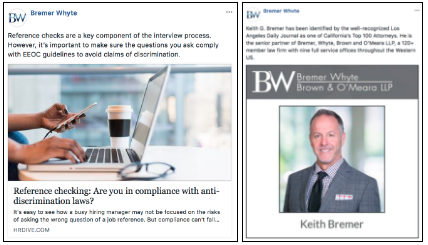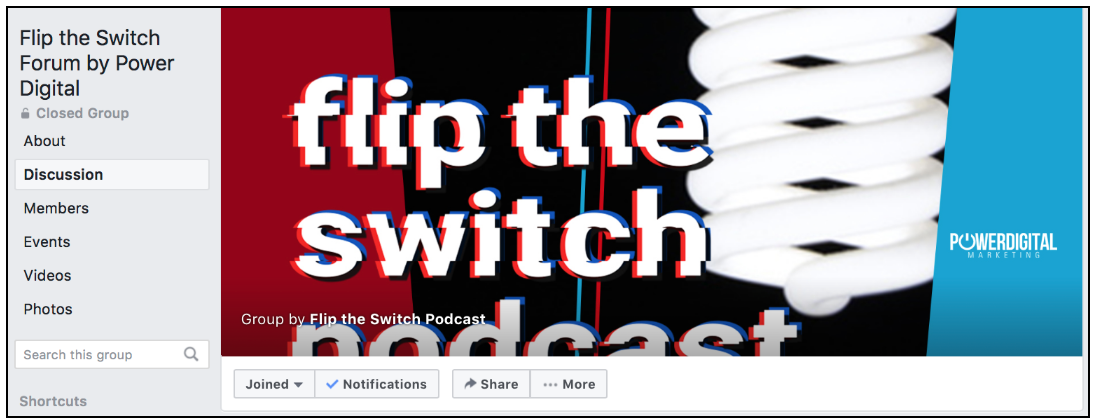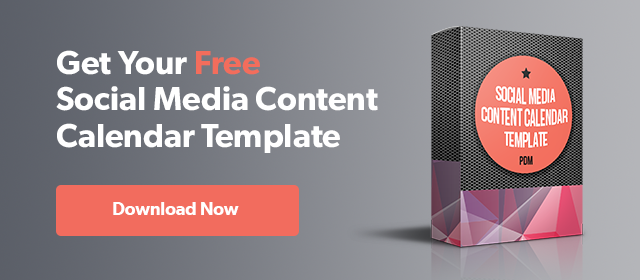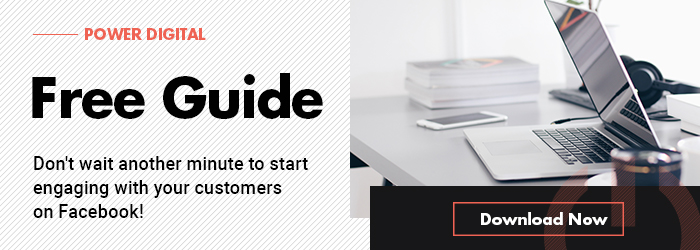Facebook Page vs. Facebook Group

A Facebook Page
A Facebook page is your public entity on Facebook. This is your brand’s profile in which to share information with the general public and your following. To fully utilize a Facebook Page, you will want to fill out your company’s “About” section, “Shop” section, and whatever other sections fit with your brand’s purpose and persona. From there, it is mainly about providing excellent customer service and communication, sharing a fresh and compelling content strategy, and continuously engaging with your public audience.
Related: How To Create Social Business Profiles for Your Brand
Posts on a Facebook Page will vary based on what industry you are in. If your company is B2B, your content may include company information, industry trends and updates, recruiting posts, testimonial posts from past clients, credible quote posts, employee spotlights, and so much more. Below are a couple examples from Bremer Whtye’s page, a Law Firm, including an article on industry tips and an employee highlight.

If you are Direct to Consumer, your posts may include product information, influencer coverage, press coverage, blog posts, posts that engage your audience in a conversation, appealing shots of your product in use and why it is ‘the best thing ever’, sale announcements, and so much more. Below are a few examples from Infantino’s Facebook page, a baby product line.
As you can see in the posts above, this page incorporated their own blog posts that directly relate to their target audience, as well as product information and a post strictly meant for gaining engagement and opening the floor for the audience to engage in a fun banter.
Related: How To Make a Successful Social Media Campaign
Facebook Groups
A Facebook Group is better suited for when you have a very specific topic of discussion, passion, or challenge that you can create a community around. For instance, there are many Facebook Groups dedicated to parents of children that have certain disabilities. Each particular group serves the purpose of bringing these parents together to share their stories, advice, and so much more. In this particular example, it is an amazing gift to have these groups in which to associate and find comfort + information within. As you can see, information shared within these group is private and may or may not want to be shared on a public page, hence the need for a private Facebook Group.
In other circumstances, Facebook Groups could be created around a brand or interest. For example, SEALFIT, a brand that conducts fitness events and academies similar to Navy Seal training, would be an ideal brand for a Facebook group due to their incredibly passionate and large audience. Such a group could be built like a subscription model in which members of the group must pay a monthly or annual fee to be in the group. Of course, your brand could have a free group in which the entry point is to be invited or accepted into the group by the admin.
In SEALFIT’s hypothetical Facebook Group, they could share training tips, exclusive workouts, diet routines, special deals on upcoming events, and valuable information regarding fitness best practices or Navy Seal training. They could also go on to ask for customer feedback on their events and trainings in order to better perfect their craft as well.
The benefits of creating such a Facebook Group is that their core audience grows stronger and creates an unbreakable brand loyalty. Moreover, there are upsell and cross-selling opportunities by providing exclusive deals to this highly qualified group. It is extremely valuable to the group because there are deals and ‘top secret’ information being shared, while on the brand’s side of things, they have an audience to gain customer information from, as well as another source to further contribute to the bottom line.
If revenue is not the main goal of creating a Facebook Group, perhaps it is brand credibility. For instance, here at Power Digital, we have an awesome podcast, Flip The Switch (shameless plug-in). This podcast shares current industry information regarding marketing, cryptocurrency, and other trending business savvy information. To further boost their credibility, their Facebook Page also has a private Facebook Group in which the cast and the group’s members can engage in discussion.
The posts within this group range from prompting conversation based on trending matters, such as Mark Zuckerberg testifying in front of Congress, to topics mentioned in the podcast and more. There are also plenty of polls in which members can vote for their opinion on certain matters or vote for what they’d like to hear on the podcast. This Facebook Group gives its members a look at the behind-the-scenes conversations related to the podcast and the podcast’s purpose: sharing industry information, thoughts, and predictions.

Wrapping Up
A Facebook Page and a Facebook Group serve entirely different purposes. As a Facebook Page serves as the public image for a brand, so it should serve as a content machine to reach out to new followers and engage current followers, as well as handle customer service communication and outreach. Adversely, a Facebook Group should be kept more exclusive to members who are qualified in a particular subject or have a like-minded interest. Both can drive conversions. Both can drive brand awareness. Both are incredibly valuable when used correctly.
Our Editorial Standards
Reviewed for Accuracy
Every piece is fact-checked for precision.
Up-to-Date Research
We reflect the latest trends and insights.
Credible References
Backed by trusted industry sources.
Actionable & Insight-Driven
Strategic takeaways for real results.







